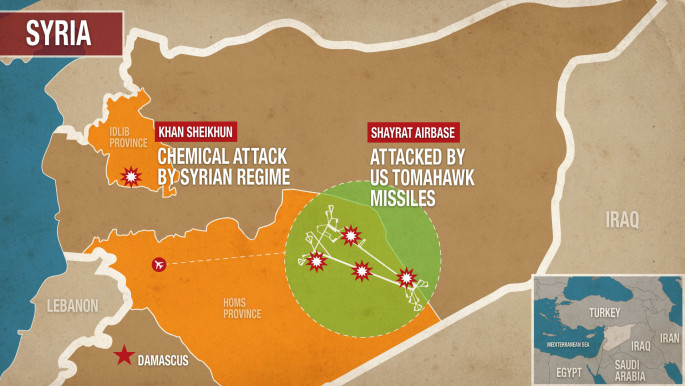
What comes next after US airstrikes in Syria?
US strikes last night targeting the Sharyat Syrian regime airforce base establish new reds lines in the Syrian civil war.
While they do not mean necessarily a radical change in the new US administration strategy on Syria, they carry significant repercussions for the regime of President Bashar al-Assad and its allies engaged in the war there.
The attack launched on the base located in central Syria - resulting in the destruction of 15 planes alongside hangars and infrastructure - followed a chemical attack by the regime on the town of Khan Sheikhun that killed 72 people including 20 children. Russia argued that only nine planes were destroyed, reported Al-Arabiya TV.
The airfield was the facility from which Syria launched the chemical weapons attack earlier this week, US president Donald Trump told reporters.
The strikes are a departure from the policy of President Trump's predecessor, Barack Obama, who responded to the 2013 regime chemical attack on Ghouta - which caused 1,400 deaths - by negotiating a deal with Russia.
This agreement forced Syria to join the Chemical Weapons Convention in 2013 and to dismantle - officially, at least - its manufacturing capability. The regime has launched nonetheless over 10 chemical attacks since.
 |
The US strikes do not necessarily mean a change in the Trump policy on Syria |  |
The US strikes do not necessarily mean a change in the Trump policy on Syria. US Secretary of State Rex Tillerson issued a statement saying there was no change to America's policy there. The US ambassador to the United Nations, Nikki Haley had previously said that United States was no longer focused on making President Assad leave power.
However, the strikes carry several implications for Syria, and for its allies. According to military analyst colonel Hassan Hamada, who was interviewed by al-Arabiya TV channel, the strike has resulted in the damage of about 20 percent of the Assad regime airforce capacity, which still disposes of over a dozen military airports and hundreds of planes.
 |
|
| [Click to enlarge] |
The regime will nonetheless think twice before using chemical weapons again, or launching attacks that would result in a high civilian cost. It will certainly change its policy in the Idlib governorate, where under the guise of "fighting terror," mass civilian killings were taking place on a regular basis.
It will also serve to roll back Assad's ambitions: The President declared in a recent interview that his only option in Syria was to continue to fight, given the Geneva process had been unproductive. "Before the strikes, the only scenario was an all-out victory for Assad, now all the other scenarios are back on the table," said Sinan Hatahet a Syrian expert affiliated with Turkey-based think tank Omran Dirasat.
Russian Foreign Minister Sergei Lavrov appeared baffled today by the US strikes. Russia, for its part condemned the missile attack against Syria, and said it was ending an agreement to minimize the risk of in-flight incidents between US and Russian aircraft operating there.
Could Russia's undisputed clout over Syria be coming to an end? Besides the recent strikes, the Trump administration is also expanding its presence in northern Syria. The United States has expanded a runway in Kobane and has seven other bases in northern Syria from where it deploys its forces in support of the Kurdish-led Syrian Democratic Forces.
Iran reportedly denounced the "destructive and dangerous" strike, according to Foreign Ministry spokesman Bahram Qasemi's declaration, as reported by the Iranian Students' News Agency.
"Iran strongly condemns any such unilateral strikes. Such measures will strengthen terrorists in Syria... and will complicate the situation in Syria and the region," he said.
 |
The Syrian regime will nonetheless think twice before using chemical weapons again |  |
In the past six years, Iran and its proxy Hizballah have operated freely in Syria, where they have buttressed Assad's power. The attacks should therefore also be taken as a strong warning to Iran and Hizballah.
The Trump administration has showed its determination to curb Iranian influence across the Middle East. According to journalist and analyst Nicolas Blanford, "Hizballah, which has evolved into a powerful enabler of Iranian influence projection across the Middle East, looks set to be a prime target of US President Donald Trump's administration, sources in Washington familiar with White House thinking said".
Ideally, the US strikes will result in the resumption of UN efforts to push for a just solution to the conflict. It is, however, unfortunately too early to say if this will infuse the international community with a new impetus to a find a solution for peace.
Mona Alami a non-resident fellow with the Atlantic council covering Middle East politics with a special interest in radical organizations. Follow her on Twitter: @monaalami
Opinions expressed in this article remain those of the author and do not necessarily represent those of The New Arab, its editorial board or staff.

![Palestinians mourned the victims of an Israeli strike on Deir al-Balah [Getty]](/sites/default/files/styles/image_684x385/public/2024-11/GettyImages-2182362043.jpg?h=199d8c1f&itok=xSHZFbmc)


![The law could be enforced against teachers without prior notice [Getty]](/sites/default/files/styles/image_684x385/public/2178740715.jpeg?h=a5f2f23a&itok=hnqrCS4x)
 Follow the Middle East's top stories in English at The New Arab on Google News
Follow the Middle East's top stories in English at The New Arab on Google News


